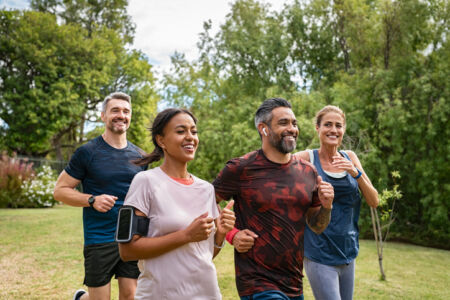
Working From Home and Vein Health: The Good and Bad
Chances are good that you or someone you know works remotely. Learn how the work-from-home environment can impact your veins, mental health, and what you can do to reduce the risks.

Exercise is excellent for your vein health. But it may not be enough to prevent varicose veins and blood clots.
One of the best ways to prevent vein disease is to exercise and get the blood flowing. But even if you work out regularly, you may still see those twisting, bulging veins on your legs, a condition that puts you at higher risk for blood clots.
Don’t let that stop you from exercising! Being athletic and in great shape keeps you and your veins healthy. But you may have risk factors that increase the likelihood of clots and varicose veins. Still, exercise, combined with treatment and other lifestyle changes, can reduce your risk of vein disease and its complications.
Anyone can develop blood clots and varicose veins if they have certain risk factors. Let’s take a look at the possibilities:
Your family history. Heredity plays a significant role in vein disease. You may also face a higher risk if a close family member has varicose veins. Athletes are no exception! Summer Sanders, a gold-medal swimmer, has openly shared her story about varicose veins. As part of the “Rethink Varicose Veins” campaign, she noted that her mother also developed the condition. Additionally, some people have an inherited condition that makes them more prone to clotting.
Your job. While working out is great, it will not make up for long periods of time standing or sitting while at work. When you’re not moving your legs, you’re letting blood accumulate in the veins. Pressure builds within, which can lead to protruding veins. In addition, blood cells tend to cluster together in a clot when blood doesn’t move. A simple way to counteract that is to take short strolls whenever you can or flex your ankles regularly. It may not seem like much, but these activities boost circulation.
Your injuries. Although you take care at all times, injuries still happen! An injury can damage veins and muscles and may keep you out of action for weeks. Being sedentary or bedridden for long periods increases the risk of blood clots.
Your hydration. Are you hydrating enough as you exercise? When you’re dehydrated, your blood thickens, causing clots to form.
Your age. Your veins pump blood with the help of tiny valves that close and push blood back to the heart. As we age, those valves weaken and cannot pump blood efficiently. The blood backslides into the vein, causing varicose veins to form. While exercising is great (and highly recommended at any age!), it will not overcome the natural effects of aging.
Besides the swollen veins, varicose veins cause pain, itching, cramping, and a feeling of heaviness in the legs. If a blood clot develops, you’ll experience swelling, usually in one leg, as well as tenderness, red-colored skin, and a feeling of warmth. Those symptoms require immediate treatment to prevent the clot from moving to the lungs, where it can cause a potentially life-threatening pulmonary embolism (PE). Shortness of breath, rapid heart rate, a blood cough, and chest pain signal a PE and must be treated immediately at an ER.
Yet it won’t get to that point with proper treatment. Compression stockings and elevating your legs are proven conservative methods. The compression stockings gently squeeze the veins to help them pump blood. Elevating your legs above your heart gets the blood flowing back to your heart. Eating a vein-healthy diet of colorful fruits and vegetables maintains strong veins. And by all means, keep exercising! It’s better for you (and your veins) to maintain your ideal weight.
Advancements in medical technology have led to the development of minimally invasive outpatient procedures that eliminate painfully bulging varicose veins. Vein treatments such as sclerotherapy, thermal ablation, and ambulatory phlebectomy can correct varicose veins during a short office visit. Recovery time is quick, and you’ll be back on the playing field or exercise mat in no time!
Center for Vein Restoration (CVR) operates a full-service vein care facility in Framingham, Massachusetts. Led by Pamela Kim, MD, RPVI, a board-certified vascular surgeon with additional certification in General Surgery and Vascular Interpretation, the office offers a full range of treatment options for varicose veins and other vascular disorders.
Contact Dr. Kim to learn more about your treatment options, or schedule your consultation appointment online today!
463 Worcester Road, Suite 205
Framingham, MA 01701